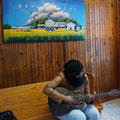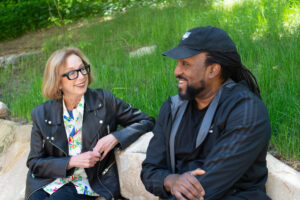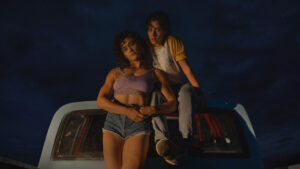Marta Cunningham speaks at a Q&A at Delta State University.
Marta Cunningham, director, Valentine Road
February 23rd
No sleep. Woke up, ate. Have to have the most important meal of the day. Heading to Cleveland, Mississippi, this morning, and we had a great discussion on our two hour drive. I am really enjoying my time with the Sundance team. We’ve really bonded and I am truly enjoying this experience.
We arrive in Cleveland and it’s a Sunday, which means we everything is closed.The town looks like a set from the 1950’s. There is not one single sole walking around, not a car, absolutely nothing. We finally realize that it’s still church time. We eat some lunch in an empty in a restaurant, very bizarre. Then we head over to Delta State for the screening for the public, students and faculty of the Delta area. Before the screening I asked for them to think about their junior high experience while watching Valentine Road. After the screening the students were very quiet, thoughtful. I told them they were in a safe space to share, and then they were on fire! Incredible questions and a very open and honest with their experiences. Some LGBT youth shared their difficult junior high experiences. One extremely adorable African America teen said she was bisexual and was chastised for dressing in “boys clothes” and was sent home. Another out African American teen with bleach blonde hair said she completely related to Larry/Leticia and was crying while she talked about the harsh bullying she received being out in middle school. One of the most surprising comments of the session was a young African American student who said he would not have liked it if Larry would have come up to him to ask him to be his Valentine. He would have been uncomfortable. I was so happy for his honesty. (Out of all of the screenings I have ever had for the last year and all the festivals I have attended not one straight male has ever admitted to this feeling in an open forum.) Right away a woman tells him that it’s a double standard and that women get hit on all the time. I speak to him about the double standard but really wanted to bring it to another level. I talk about Emmett Till, which of course he knows about, and compare the murder of Emmett Till to Lawrence King’s death. How Emmett Till whistled at a white women and was killed for it. And how Larry’s killing was very similar. I could feel that using Emmett Till as an example really spoke to him and the rest of the students he came with. I took a ton of photos with the students and the incredible teacher (who previously came out to her students) who brought them. As I was about to leave, a young white student came up to me with tears in her eyes and told me how she and her brothers grew up in foster care. She told me that she felt that one of her brothers was probably gay and how badly she treated him because of being gay and how guilty she feels now after watching Valentine Road. I spoke to her about apologizing and talking about her feelings with him after watching the film. What an incredible Q&A!
Funny coincidence or small town, take your pick. After a fantastic group dinner we head over to Red’s Juke Joint in Clarksdale. Authentic in every way. Watermelon Slim was playing. Everything from his original music to Robert Johnson to the Jimi Hendrix. He was incredible mix of performance artist and Blues musician. His harmonica was electrifying. I was so happy to finally feel like I had experienced an authentic Blues joint in the Delta. Before going to bed I felt the need to talk to some local Black people and quizzed the front desk about their experience of being African American born, raised and working in the the South. Both two young men told me that they feel the racism, but that they try not to take to “take it personally.” I asked them if it still hurts being called the N word by white people and having it flow so freely around them? They told me yes it does get in and it hurts but “that’s just how it is down here.” I think what makes me the saddest about being here is how beat down and tired the young people are. Both these men were in their twenties. No fight in them really. Absolutely exhausted from being so oppressed for their entire lives. And really the masking that is done with the guise of Southern hospitality is upsetting to experience. So much sadness. Most of the young white female teachers I have met who are teaching these young African American students are from outside of the South.
February 24th
I woke up with a question on my mind and wanting to discuss this with the only other African American in our group, Thabi. (Just to give you a little background, Thabi works for the Mississippi Film Office. She seems to find my upfront, honest approach to the obvious racism that no one talks about ever in “mixed company” refreshing. She is also fairly young and was born and raised in Mississippi. She’s also the AP on the doc Prom Night in Mississippi.) My questions I pose to Thabi are: Why do white people refer to other white people as “Mr.Robert or Miss Kate” and just call me Marta? It was an answer I knew already but I just wanted to bring it to her attention how horrible these every day occurrences are.
I was lucky enough to be able to watch Nisha’s beautifully made doc The World Before Her that is also on the Film Forward tour in Mississippi. It is a very powerful story about two separate worlds in India between the young girls who pick pageantry to “get out” versus those who choose the route of the Hindu fundamentalist. The Q&A was truly eye opening. One extremely sophisticated and attractive young African American student said he wished he had a culture he felt proud and passionate about. He said that as a race, “African Americans are slipping.” This statement and his demeanor broke my heart. I spoke to him afterwards about various leaders in our community he could read about to draw inspiration. He asked if “he just had to keep on fighting” and I answered a resounding YES! He is an example of a lot of the African American people I have met, young and old, that feel completely unsupported and there is a great disconnect to the history of the land and our incredible culture that rose above the outrageous injustice. I am touched that he felt safe enough to share his true feelings about our culture, but we need to be helping our youth with better role models and stories to uplift. Many of the young people here are not be taught their worth or the greatness of our people. It’s heartbreaking.
In the afternoon we had another panel to discuss storytelling. And then we all wanted to go and see the “crossroads,” the place where Robert Johnson sings about “I went to the crossroads fell down on my knees.” I’m a huge fan of the Blues. But first they took us all to Dockery Farms, a plantation. I have no desire to go at all. When I first arrived I was very disturbed by the guide’s interpretation of the history of the “farm” by calling the slaves “workers” and “employees.” Remember, Mississippi just last year, 2013, abolished slavery and adopted the 13th amendment! He referred to them as “employees” and bragged that Mr. Dockery paid them the most out of any other “place.” never referring to it as a cotton plantation and the slaves as slaves. As for them being “paid,” they were not paid in U.S. currency but in tokens they minted there at the plantation. They looked liked pressed out metal buttons you would find on a pair of jeans. I thought I was going to start crying on the spot; I felt sick to my stomach. He continued to talk about how fantastically the “employees” were treated and i had to walk to the other side of the room. I couldn’t bring myself to touch his “money” as he very cheerfully passed it around to us. This is what revisionist history is. This guide also recanted a few racist jokes or stories stories throughout the tour. We then all went outside and walked the land. It was one of the worst feelings I have experienced in my life. The trees surrounding the plantation, you could feel how they had been used for lynchings, strange fruit, as Billie Holiday song speaks of:
“Southern trees bare strange fruit, Blood on the leaves and blood in the root, Black body swinging in the Southern breeze, Strange fruit hanging from the poplar trees.”
The river that flowed in the back as a burial. It was horrible. And all the while our tour guide was talking on and on how well the “workers” were treated and at one point I just had to walk away. Again revisionist history of a past that they are now recreating as almost for our amusement. Talking about the plantation where they had good times and were paid well. We have a lot of work to do connecting the South to their true crimes against humanity, because from where I am sitting they are completely negating the entire slavery experience. Horrifying. To think that they are selling themselves as a place to come where the Blues was created is truly shameful.
We all felt cleansed after reaching the site of the crossroads, a spiritual trek I hope the slaves were able to take. It was truly magical out there at the cross in the road. The devil wasn’t there but it was definitely hell on Earth for those poor people back at the Dockery plantation. Nisha and I paid our respects to a makeshift graveyard of slaves before leaving the area. One image I will never forget is the headstone that said, “ROSA E PERKINS DIED NOV 9 AGED 26 YEARS” and on the top of the gravestone “Household of Ruth.” Someone’s property. This woman lived 26 years in this hell. So young by our standards but just think how hard her life was for that period of time. I think we were all feeling like we had just bared witness to some real atrocities. Something felt but not seen. The Ghosts of Mississippi are loud and clear.
I definitely want to come back to be a part of the change. Mississippi is a state that feels like it has been written off and forgotten by the other states. Always the lowest in education and many other aspects. Some teachers have even witnessed the paddling of black children in public schools. It is completely in great need of support and inspiration and I hope our films created a starting out point to keep the dialogue of change going. There are good people here doing amazing work and they need to be recognized–like Anna from Safe Schools Coalition and Alison Fast of Barefoot Workshops and Constance from the ACLU, who refuse to give up the fight of inequity across the board. Who see the incredible injustices in this state and are fighting everyday for change in their own way. The town of Hattiesburg in Mississippi who have “opened their doors” to the LGBT community and announced their status of being a safe place to live for people of the LGBT community. All things matter. I am very grateful for bring brought down by Film Forward and their partners at the Mississippi Film Commission. I will definitely be back.




